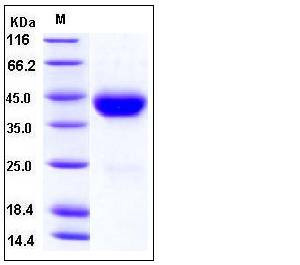Mouse CD38 Protein (His Tag)
ADPRC 1-rs1,ADPRC1,Cd38,Cd38-rs1,I-19
- 100ug (NPP3230) Please inquiry
| Catalog Number | P50191-M08H |
|---|---|
| Organism Species | Mouse |
| Host | Human Cells |
| Synonyms | ADPRC 1-rs1,ADPRC1,Cd38,Cd38-rs1,I-19 |
| Molecular Weight | The recombinant mouse CD38 consists of 271 amino acids and has a calculated molecular mass of 31.3 kDa. As a result of glycosylation, the apparent molecular mass of rmCD38 is approximately 38-42 kDa in SDS-PAGE under reducing conditions. |
| predicted N | Leu 48 |
| SDS-PAGE |  |
| Purity | > 97 % as determined by SDS-PAGE |
| Protein Construction | A DNA sequence encoding the extracellular domain of mouse CD38 (NP_031672.2) (Leu 45-Thr 304) was expressed, fused with a C-terminal polyhistidine tag. |
| Bio-activity | |
| Research Area | Immunology |Adaptive Immunity |B Cell |B Cell CD Antigen |
| Formulation | Lyophilized from sterile 20mM MES, 0.15M NaCl, pH 6.5 1. Normally 5 % - 8 % trehalose, mannitol and 0.01% Tween80 are added as protectants before lyophilization. Specific concentrations are included in the hardcopy of COA. |
| Background | The cluster of differentiation (CD) system is commonly used as cell markers in immunophynotyping. Different kinds of cells in the immune system can be identified through the surface CD molecules which associating with the immune function of the cell. There are more than 320 CD unique clusters and subclusters have been identified. Some of the CD molecules serve as receptors or ligands important to the cell through initiating a signal cascade which then alter the behavior of the cell. Some CD proteins do not take part in cell signal process but have other functions such as cell adhesion. Cluster of differentiation 38 (CD38), also known as ADP-ribosyl cyclase, is a glycoprotein found on the surface of many immune cells (white blood cells), including CD4+, CD8+, B and natural killer cells. It shares several characteristics with ADP-ribosyl cyclase 2 CD157. CD38 is a multifunctional ectoenzyme that catalyzes the synthesis and hydrolysis of cyclic ADP-ribose (cADPR) from NAD+ to ADP-ribose. It also functions in cell adhesion, signal transduction and calcium signaling. CD38 has been used as a prognostic marker in leukemia. It can also be used to identify plasma cells. |
| Reference |
